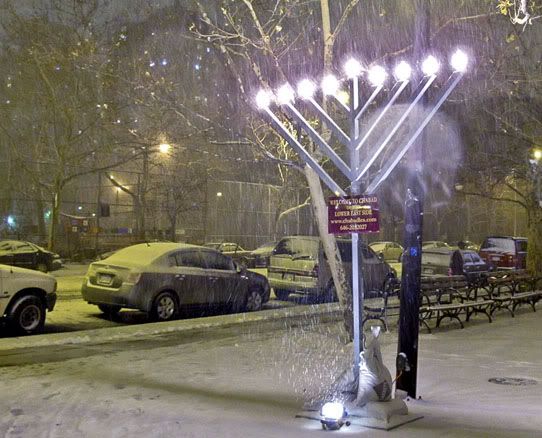
from nycparks
This small Lower East Side park is one of New York City’s oldest. On August 2, 1824, the Common Council agreed to take a triangular piece of land between Grand, Harman (now East Broadway), and Scammel Streets as a public place. The City acquired the parcel by condemnation the following year for $3158.23.
In 1870 all of New York’s public parks, from small public squares in Lower Manhattan to the not-yet-complete Central Park, were placed under the control of the newly created Department of Public Parks. Sweeping improvements were initiated immediately. Between 1871 and 1872, Grand Street Place (as this park was then known) was surveyed and received new lampposts, plantings, curbs, water and drain pipes, and an iron railing. It was one of fourteen New York parks that featured a program of music and fireworks on Independence Day in 1873.
By the early 1910s, this site was known as Oriental Park. According to Department of Parks Annual Reports from 1911 and 1913, several trees were removed and replaced with four European lindens, three Norway maples, and eight Oriental plane trees. In 1923 the Board of Aldermen named the park for John Francis Ahearn (1853-1920), a Tammany Hall sachem who rose to power around the turn of the century. Ahearn’s leadership style was marked by his intense political game-playing and by his devotion to the personal needs of his constituents.
Born in New York City, Ahearn was educated at public schools and worked as a business clerk. He served one term in the State Assembly, from 1882 to 1883, and five terms in the State Senate, from 1890 to 1902. Senator Ahearn championed the interests of firemen, policemen, and school teachers. Elected Manhattan Borough President in 1903, he was the subject of a damaging report made by Commissioner of Accounts John Purroy Mitchel to Mayor George McClellan. Without accusing Ahearn of personal dishonesty, Governor Charles Evans Hughes denounced Ahearn’s administration as flagrantly inefficient and wasteful, and he removed Ahearn from office. The Board of Aldermen then selected Ahearn in 1907 to fill his own vacancy. After a legal struggle, Mayor McClellan removed Ahearn from office just before the end of both of their terms in December 1909. Ahearn died in his home at 296 East Broadway in 1920.
Ahearn Park assumed its present dimensions in the early 1960’s. A portion of the property was eliminated by the widening of Grand Street, and two parcels to the west were transferred to Parks and incorporated into the site. The park was renovated in 1998 under a $83,000 requirements contract funded by Mayor Giuliani. Improvements included installing new world’s fair benches, resetting the Belgian block, repaving the park and sidewalks, and creating a planted area enclosed by a steel picket fence. The renewed Ahearn Park is an enduring oasis in the Lower East Side.

No comments:
Post a Comment